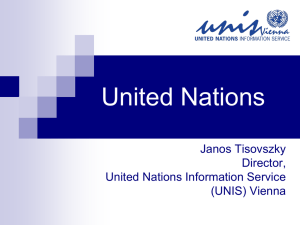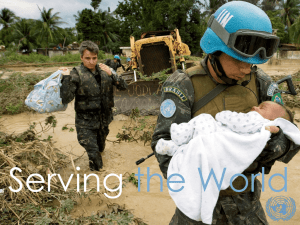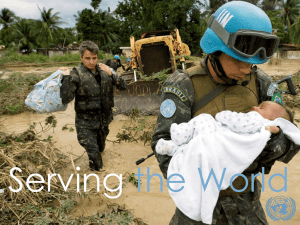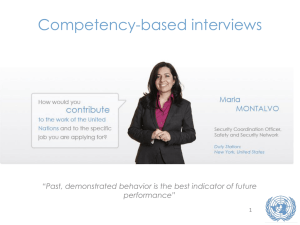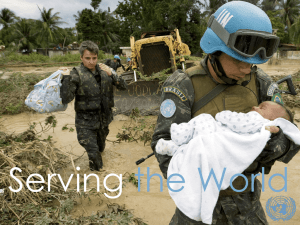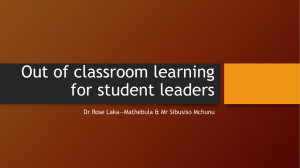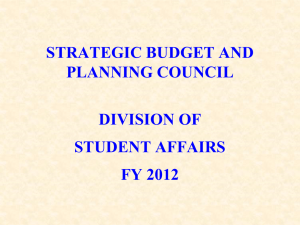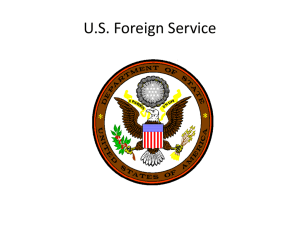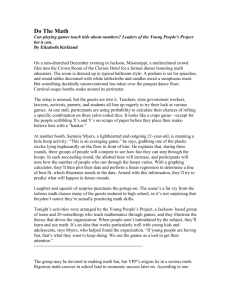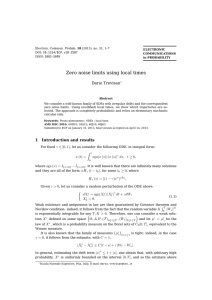How did you handle it?
advertisement
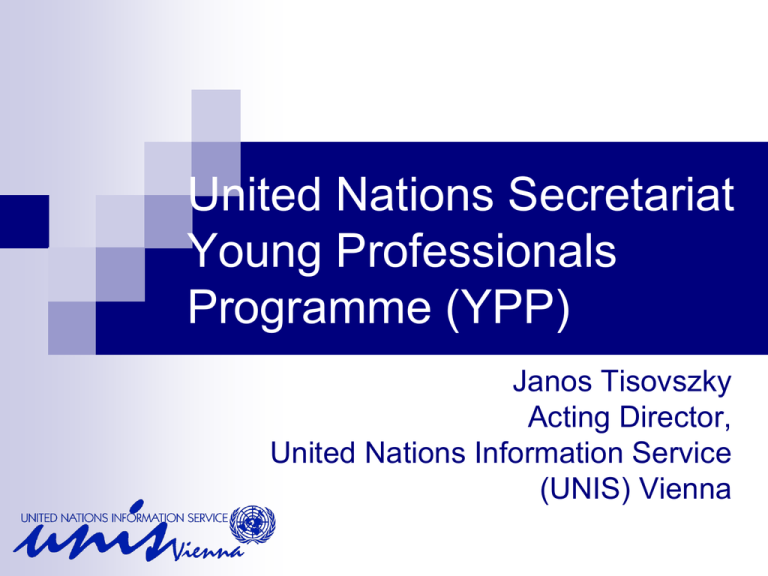
United Nations Secretariat Young Professionals Programme (YPP) Janos Tisovszky Acting Director, United Nations Information Service (UNIS) Vienna United Nations: Introduction UN Charter The purposes of the United Nations are to: maintain international peace and security; develop friendly relations among nations; achieve international co-operation in solving international problems; and be a centre for harmonizing the actions of nations in the attainment of these common ends. UN Secretariat (1) Carries out day-to-day work of the Organization and services its principal organs Staffed by international civil servants Headquartered in New York, Geneva, Vienna, Nairobi, with offices and field missions around the world 44,000 staff members UN Secretariat (2) Headed by the SecretaryGeneral of the United Nations, Ban Ki-moon Vision: Building a stronger United Nations for a better world United Nations: Areas of Work Development Peace and Security Human Rights Humanitarian Affairs International Law Development: Millennium Development Goals Millennium Development Goals 1. 2. 3. 4. 5. 6. 7. 8. Eradicate extreme poverty and hunger Achieve universal primary education Promote gender equality and empower women Reduce child mortality Improve maternal health Combat HIV-AIDS, malaria and other diseases Ensure environmental sustainability Global partnership for development International Peace and Security Preventing and Resolving Conflicts Peacekeeping: Current Missions Human Rights Human Rights: Dignity and Justice for all of us Universal Declaration of Human Rights Universal principles in a living document Foundation of international Human Rights Law World’s most translated document: 360 languages Human Rights: Actors Primary responsibility: the individual State United Nations: General Assembly Charter-based bodies: Human Rights Council Special procedures: Special Rapporteurs, Independent Experts, Working Groups Treaty-based bodies High Commissioner for Human Rights Humanitarian Affairs Humanitarian Affairs: Did you know, the UN… Feeds 90 million people in 73 countries in 2011 (WFP) Assisted children in 290 humanitarian situations in 98 countries in 2010 (UNICEF) Is a global leader in vaccine supply, reaching 40% of the world’s children (UNICEF) Humanitarian Affairs International Law: Did you know… Over 500 multinational treaties – on human rights, terrorism, international crime, refugees, disarmament, commodities and the oceans – have been enacted through the efforts of the United Nations. Priorities Priorities and the way ahead Secretary-General Ban Ki-moon has outlined five imperatives: Five generational opportunities to shape the world tomorrow by the decisions we make today Five imperatives Sustainable development Prevention Building a safer and more secure world Supporting nations in transition Working for – and with – women and young people Young Professionals Programme (YPP): Context Expectations of UN staff For expectations of UN Staff, see: Charter of the United Nations Staff Rules and Regulations Values, Competencies, Mobility Core values: Integrity, Professionalism, Respect for Diversity Core competencies and managerial competencies Mobility: Functional and geographic Staff selection Positions advertised on http://careers.un.org Open to external and internal candidates Exception: entry-level professional positions (YPP) YPP: the Process Written Examination Oral Examination Placement Assignment, Orientation and Development YPP 2011 Job families: Administration Humanitarian Affairs Public Information Statistics Member States Participating: 77 YPP: Written Examination Written Examination Wednesday, 7 December 2011 Overall time for the written examination: 4.5 hours Structure: General paper Specialized paper Examinees are fully responsible for any expenses related to their travel to the examination centre General Paper Summary and several questions in International Affairs, To be answered in either English or French; Eliminatory Specialized Paper Essays and short questions in the substantive area To be answered in any of the UN official languages. The essay part of this paper is eliminatory YPP: Oral Examination The Examination: Oral Part Competency-based interview and possibly an oral presentation. UN Secretariat will cover the travel expenses of examinees invited to the oral examination Values and competencies Values: Shared principles and beliefs that underpin the Organization’s work and guide actions and behaviours of staff Competencies: Skills, attributes and behaviours directly related to successful job performance Values and Competencies Core Values Integrity Professionalism Respect for Diversity Core Competencies Communication Teamwork Planning and Organizing Accountability Creativity Client Orientation Commitment to Continuous Learning Technological Awareness Managerial Competencies Vision Leadership Empowering Others Managing Performance Building Trust Judgement and Decision-making Competency-based interviews “Past, demonstrated behavior is the best indicator of future performance” Questions ask about past professional experiences that can demonstrate that the applicant is competent CAR (L) Principle Context: o You will be expected to give an overview of the situation: what the situation was about, how you first got involved, what were the key events and the time frame Actions o You will be expected to cover significant events, specific instances, that were clearly attributable to you rather than the team Results o What was the outcome, impact or results of your actions: You may be asked questions such as how did it turn out? What was the final result? Learning o What did you learn from this experience? 38 During the interview: do Make a good first and last impression Dress appropriately Maintain eye contact with the person who asked the question, if culturally appropriate Even on the telephone, smile Listen carefully to the complete question. Ask for clarification if a question is not clear Keep to the point. Be as specific as possible Provide concrete examples that show you were able to handle a situation and/or learned from it During the interview: do not Answer in the hypothetical Talk about “we”, rather talk in the “I” Espouse theories or values (“waffling on”) Make blanket generalizations nor statements about the future Interrupt the panel Ask questions about benefits and entitlements Exercise: Teamwork Describe to us a successful teamwork work experience o What was the situation? o What was your role? o What made the team successful? o How did you handle any disagreements within the team? o What were the results? o What did you learn from the experience? If you had to do it again what would you do differently? 41 Exercise Planning and Organizing Tell us about a time you had to organize or plan a major event o What was the nature of the event? o What was your role? o How did you plan and organize the different actions to carry out? o How did the event turn out? o Reflecting back, what did you learn from the experience? If you had to do it again what would you do differently? 42 Exercise Planning and Organizing Tell us about a time where you had a number of demands being made on you at the same time? How did you handle it? o What was the situation? o What was your role? o How did you plan and organize the different actions to carry out? o What were the results? o What did you learn from the experience? If you had to do it again what would you do differently? 43 Exercise: Creativity Describe to us a situation when you had to be creative o What was the nature of the situation? o What was your role? o What were the different actions you carried out? o What were the results? o What did you learn from the experience? If you had to do it again what would you do differently? 44 Exercise: Integrity Describe to us a situation where you felt pressured to act in a way that would compromise your values or those of the organization o What was the nature of the situation? o What were the implications of your actions? o How did you respond to the pressure? o What was the results? o What did you learn from the experience? If you had to do it again what would you do differently? 45 YPP: Results and Placement Successful Candidates Placement To be placed in positions at the P-1 or P-2 level in any Secretariat duty station or peacekeeping operation. Reserve List Only those who cannot be placed will be kept on a reserve list, from which future vacancies will be filled. The reserve list has a lifespan of two years after the conclusion of the examination. Candidates who refuse one invitation to interview or one official offer of employment will be removed from the reserve list. Assignment, Orientation & Development Initial assignment: Two years Second assignment: In a different duty station Two-week orientation programme prior to first assignment Dedicated training budget to ensure professional development Working for the UN Who we are We are international civil servants. Our work touches lives in every corner of the globe is complex and multifaceted extends directly and indirectly to our 193 Member States. In the last decade, the United Nations has increased its field-based operations Over 50 per cent of our 44,000 staff work in field locations all over the world Over 100,000 personnel in 16 peacekeeping and 11 political missions Where we are Geneva Nairobi New York Vienna The Hague Santiago Arusha UNOG, UNCTAD, OHCHR, ECE, OCHA UNON,UNEP, UN-Habitat UN Headquarters Addis Ababa Bangkok Beirut ECA ESCAP ESCWA UNOV, UNODC ICTY ECLAC ICTR 52 Types of Jobs Administrators Aviation Cartography Audit Conference and Language Staff Drug Control & Crime Prevention Demographics Economic Affairs Electoral Affairs Engineering Information and Communications Technology Information Management Library Science Logistics Procurement Medical Programme/Project Management Security Humanitarian Affairs Human Rights Legal Affairs Political Affairs Public Administration Public Information, Radio & TV Rule of Law Social Affairs Statistics Professional Jobs Experience requirements after obtaining your degree: o P-2 = YPP or Language recruitment examination or 2 years without exam o o o o P-3 = 5 years P-4 = 7 years P-5 = 10 years D-1/D-2 = 15 years Pay and benefits Competitive Salaries Annual & Sick Leave Home Leave Maternity & Paternity Leave Education Grant & Travel Rental Subsidy Defined-benefits Pension at age 62 Health Insurance Installation & Shipment & Repatriation Pay for Additional Official Language Mobility and Hardship Pay Rest and Recuperation (peacekeeping missions) Mentoring Programme for New Staff Development & Learning opportunities Application Process Search for job openings Understand the position and location Create a profile and draft application Apply to a job opening Evaluation of the application Assessment exercise Competency-based interview Background checks Selection notification Personal History Profile (PHP) Description of Duties Summary of Achievements Duties: o What you did in your job Achievements: o How well did you do in your job Describe your responsibilities with careful attention to the vacancy for which you are applying Provide specific examples where you made an impact/contribution in the positions you have held Use o o Current job: present tense Past job(s): past tense Cover Letter Describe how your experience, qualifications and competencies match the specific position You can distinguish yourself from other candidates by highlighting what makes you a good match for the position Structure o o o Open with a statement of interest Summarize your qualifications, experience and competencies relating to the specific positions Close with a brief recapitulation Make it impressive and customize it Additional Tips The UN will first get to know you through your application/PHP Be truthful, accurate and specific Make your words count Prepare application/PHP offline using a word processor application (e.g. MS Word) Print application/PHP on screen or paper to proofread and review Save your applications Thank you for your attention! www.un.org http://careers.un.org www.unis.unvienna.org
